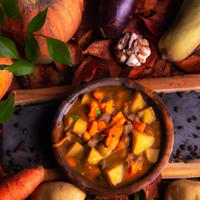
1 serving (250 grams) contains 200 calories, 5.0 grams of protein, 8.0 grams of fat, and 30.0 grams of carbohydrates.

Log this food in SnapCalorie

Nutrition Information
Calories |
188.7 | ||
|---|---|---|---|
% Daily Value* |
|||
| Total Fat | 7.5 g | 9% | |
| Saturated Fat | 1.4 g | 7% | |
| Polyunsaturated Fat | 0 g | ||
| Cholesterol | 0 mg | 0% | |
| Sodium | 377.4 mg | 16% | |
| Total Carbohydrates | 28.3 g | 10% | |
| Dietary Fiber | 4.7 g | 16% | |
| Sugars | 5.7 g | ||
| protein | 4.7 g | 9% | |
| Vitamin D | 0 mcg | 0% | |
| Calcium | 47.2 mg | 3% | |
| Iron | 1.9 mg | 10% | |
| Potassium | 377.4 mg | 8% | |
* Percent Daily Values are based on a 2,000 calorie diet. Your daily values may be higher or lower depending on your calorie needs.
Food Attributes
Source of Calories
About Ghanaian vegetable stew
Ghanaian Vegetable Stew is a hearty, flavorful dish rooted in Ghana's rich culinary traditions. Typically made with a vibrant mix of fresh vegetables such as eggplant, okra, tomatoes, spinach, peppers, and onions, it often includes a base of palm oil for richness and bold flavor. Commonly seasoned with ginger, garlic, and spices, this stew delivers both warmth and depth. While it can be enjoyed on its own, it’s often served alongside staples like rice, yams, or plantains. Packed with fiber, vitamins, and antioxidants, Ghanaian Vegetable Stew supports digestion and immune function, making it a nourishing choice. However, the use of palm oil contributes significant fat content, though it contains beneficial compounds like Vitamin E. Substituting or balancing fats can tailor the dish for lower-calorie diets without sacrificing flavor. It’s a wonderful example of how Ghanaian cuisine celebrates fresh, wholesome ingredients with bold tradition.



